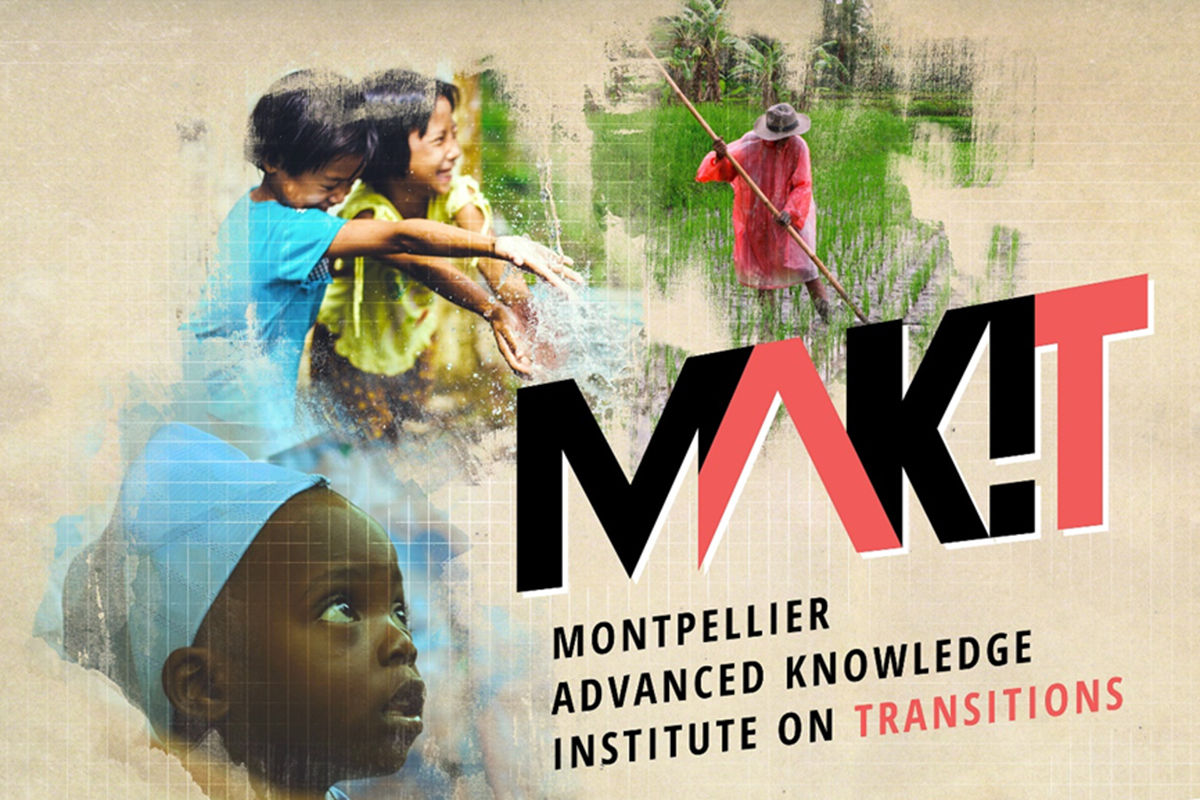Accelerate societal transitions with MAK'IT
Since 2019, the Institut d'Etudes Avancées de l'Université de Montpellier, known as MAK'IT , has been hosting researchers in residence from different geographical horizons and disciplines. Their aim: to contribute to achieving the United Nations' Sustainable Development Goals (SDGs) by analyzing and accelerating transition in the fields of the environment, health and agriculture.

Some thirty researchers from foreign institutions have already taken part, or are currently taking part, in one of the four host programs offered byMAK'IT, the Institut d'Etudes Avancées (IEA) at the University of Montpellier, headed by Patrick Caron, Vice-President in charge of international relations. There are currently around 100 IEAs worldwide, but only eight in France: Lyon, Paris, Marseille, Nantes, Cergy, Toulouse, Strasbourg and Montpellier. MAK' IT's first specificity is its thematic focus: the environment, health and agriculture ," explains Marianne Chaumel, project manager at Muse. Our second specificity is a strong orientation towards the "South", where half of the researchers we welcome come from. Finally, we place great emphasis on the dialogue between social sciences and life sciences.
Science-society links at the heart of the approach
What do these researchers from different disciplines and continents have in common? To help accelerate the transitions needed to achieve the United Nations' Sustainable Development Goals by 2030. With this in mind, MAK'IT is proposing an original approach to resident researchers: " We are asking researchers, through their work, to tackle the societal controversies that can be at the root of the bottlenecks holding back transitions," emphasizes Marianne Chaumel.
" The link between science and society is at the very heart of our approach, since the results of our research must be applicable or restitutable to civil society ", continues the project manager. Thus, the organization by and for researchers of colloquia, seminars and public meetings bringing together players from the socio-economic, political, associative and artistic worlds is strongly encouraged, as is the deployment of innovative teaching content and curricula. Since 2020 and the first MAK'IT events, the Institute's researchers have organized a dozen events involving over 70 speakers and 1,000 registrants. MAK'IT was also involved in the Africa 2020 Season. MAK'IT' s approach is based on four formulas, corresponding to the four hosting programs on offer.
" Guest scientists: a prestigious program
4D photoacoustic imaging of the heart and brain for Craig Goergen from the USA; combating Chagas disease for Marcelo Lorenzo from Argentina; camel milk technology and markets for Gaukhar Konuspayeva from Kazakhstan, or the use of peri-urban land for Roel Plant from Australia... The " Visiting Scientists " group is geographically and thematically diverse. This 3-10 month program is reserved for " senior" researchers with at least 10 years' post-doctoral experience. " In this program, researchers must propose a cross-disciplinary project. They are integrated into the local scientific community, since each of them is invited by a unit that co-finances his or her visit," explains the project manager.
Six researchers are taking part in the program for 2021-2022, with the first representative from the Middle East coming from Lebanon. Marianne Chaumel is delighted to report: " In all, we have received over 200 open applications, which testifies to the growing interest in this program. The vast majority of the researchers we currently welcome work in the biology-health field. In September, we will also be welcoming our first female physics researcher.
"Cohort": group research
Second formula: the " Cohort " program. A MAK'IT exclusive, this program enables a small group of researchers working in a variety of fields to work together for six months on a theme chosen by MAK'IT. " Our first cohort worked on the theme of 'Fake news or failing science', and took part in a Science Bar on the subject. The group we will be receiving between January and June 2023 - the corresponding call for applications is currently open - will look at the question: 'What roles for science in times of crisis?'. MAK'IT, in collaboration with the South Center, an intergovernmental organization based in Geneva, is organizing an international conference on the same theme on April 7 in Montpellier, where several high-level international experts are expected to attend.
The researchers in the cohort, housed in an open space at Muse, are expected to produce at least one joint, transdisciplinary publication. " With this program, they commit themselves to working two days a week on this joint project, while the rest of their time can be devoted to advancing their personal lines of research," explains Marianne Chaumel.
"ISAF and CAT: the network forwards
The FIAS ( French Institutes for Advanced Study ) program, open to researchers in the social sciences and humanities, offers the same hosting arrangements as the " Visiting Scientists " program, i.e. a ten-month residency co-financed by a research structure of the University of Montpellier or one of its partners. The difference is that this program, shared by five French IEAs, is managed by the French Network of IEAs (RFIEA). Of the 28 residencies proposed for 2022-2023, three will take place in Montpellier. In 2021-2022, the UM has welcomed Margreet Zwarteveen from the UNESCO Water Centre in Delft, the Netherlands, and Myrtille Lacoste from Curtin University in Australia.
Finally, the CAT(Constructive Advanced Thinking) program is run by the European Network of IEAs, known as NetIAS. It offers transdisciplinary teams of young researchersdoctoral students or post-doctoraldoctoral students) the opportunity to spend one or two weeks in different European IEAs. " Montpellier has already hosted two one-week CAT groups. We organize visits and meetings with researchers from the Montpellier area, all related to the proposed theme of course ", explains Marianne Chaumel. Anti-vaccination attitudes and sustainable cities were on the agenda for 2021. The next groups to be hosted will be working on the role of light in human well-being and depression in nursing homes.